 Champagne corks were popping like manic machine gun fire at Google yesterday as the company reported a thumping fivefold increase in profits in the first quarter.
Champagne corks were popping like manic machine gun fire at Google yesterday as the company reported a thumping fivefold increase in profits in the first quarter.
The Californian search giant purred loudly as it revealed that net income for the quarter ended 31 March, based on generally accepted accounting principles, was $369 million (£193/€282m) or $1.29 (£0.67/€0.98) a share, compared with a measly $64 million (£33.5m/€49m) or 24 cents a share, for the same period a year ago.
Naked execs excitedly rolled around in beds covered in dollar notes* as revenues for the quarter racked up to $1.26 billion (£0.65bn/€0.96bn), a massive 93 percent increase from the previous year.
“This was a very strong quarter for Google,” revelled Eric Schmidt, chief executive for Google, “We continue to execute well and we have been able to take full advantage of the growth in online advertising.”
Internet advertising revenue as a whole is becoming a large, well-fed cash cow, increasing by 32 percent last year to just under $9.6 billion (£5.02bn/€7.34bn), compared with $7.3 billion (£3.81m/€5.58m) in 2003, according to the Interactive Advertising Bureau.
Google’s own sites, which rely heavily on paid search results and on users clicking on ads, brought home $657 million (£343.6m/€501.7m) – 52 percent of the company’s total revenues and a 116 percent increase over the same quarter a year ago.
 Revenues generated from Google’s partner sites through its AdSense programs generated $584 million, or 47 percent of revenues, – a hefty 75 percent increase over partner-related revenues a year ago.
Revenues generated from Google’s partner sites through its AdSense programs generated $584 million, or 47 percent of revenues, – a hefty 75 percent increase over partner-related revenues a year ago.
They’ve also been bulk-buying new desks and chairs and introducing crowd control around the water cooler at Google, with the company hiring another 461 employees since the end of the fourth quarter last year, bringing the total up to 3,482 full-time employees.
(*we may be exaggerating slightly here)
 Unlike several telecoms companies in the US who are hell bent on blocking free Wi-Fi hotspots, BT has stated that it has “no problems” with the concept.
Unlike several telecoms companies in the US who are hell bent on blocking free Wi-Fi hotspots, BT has stated that it has “no problems” with the concept.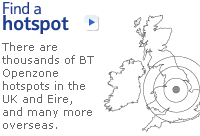 The network covers the length of Upper Street – one of the busiest streets in Islington – with the Council donating PCs to some local businesses as part of its push to boost economic activity in the area and to encourage local residents onto the Internet.
The network covers the length of Upper Street – one of the busiest streets in Islington – with the Council donating PCs to some local businesses as part of its push to boost economic activity in the area and to encourage local residents onto the Internet. Clark does not envisage US-style legal wrangling in the future for the UK and expressed confidence that if more people use Wi-Fi it will drive demand for BT’s services.
Clark does not envisage US-style legal wrangling in the future for the UK and expressed confidence that if more people use Wi-Fi it will drive demand for BT’s services.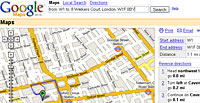 Web search goliaths Google have delivered a large size nine up the rear end of their fierce rivals Yahoo by being the first to launch a local search service in Britain.
Web search goliaths Google have delivered a large size nine up the rear end of their fierce rivals Yahoo by being the first to launch a local search service in Britain. “It’s the first time we’re bringing local search to a country outside North America,” said Kate Burns, ad sales and operations manager for Google in Britain, declining to give details about launches elsewhere in Europe.
“It’s the first time we’re bringing local search to a country outside North America,” said Kate Burns, ad sales and operations manager for Google in Britain, declining to give details about launches elsewhere in Europe.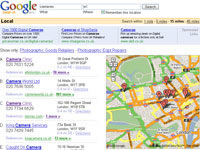 Global search advertising revenue is already sending cash tills into overdrive, with US investment bank Piper Jaffray estimating spending to rise to US$7.9 billion (£4.1BN/€6bn) in 2005 from US$5.5 billion (£4.1bn/€4.2bn) in 2004 – with most of the growth coming from international expansion and higher volume.
Global search advertising revenue is already sending cash tills into overdrive, with US investment bank Piper Jaffray estimating spending to rise to US$7.9 billion (£4.1BN/€6bn) in 2005 from US$5.5 billion (£4.1bn/€4.2bn) in 2004 – with most of the growth coming from international expansion and higher volume. After years of throwing pans at each other, Sony and Toshiba are set to kiss and make up and develop a universal standard for next-generation DVDs, according to a report in the Nihon Keizai Shimbun business daily.
After years of throwing pans at each other, Sony and Toshiba are set to kiss and make up and develop a universal standard for next-generation DVDs, according to a report in the Nihon Keizai Shimbun business daily. Two competing formats developed out of this technology, with Sony and Matsushita (Panasonic), introducing the Blu-ray standard in February 2002, with Toshiba and NEC Corp. following with the HD DVD standard.
Two competing formats developed out of this technology, with Sony and Matsushita (Panasonic), introducing the Blu-ray standard in February 2002, with Toshiba and NEC Corp. following with the HD DVD standard.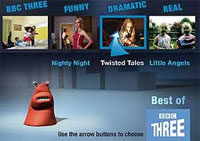 BBC Three viewers will be able to schedule their own Sunday night viewing in a pioneering multi-screen application trial starting on 1 May 2005.
BBC Three viewers will be able to schedule their own Sunday night viewing in a pioneering multi-screen application trial starting on 1 May 2005. Emma Somerville, the BBC’s Head of Interactive Programming, added: “Interactive TV can really help our audiences engage with the BBC’s TV channels.”
Emma Somerville, the BBC’s Head of Interactive Programming, added: “Interactive TV can really help our audiences engage with the BBC’s TV channels.” Old school TV listings magazine The Radio Times, has announced a partnership with Gemstar, the Murdoch-owned electronic programme guide (EPG).
Old school TV listings magazine The Radio Times, has announced a partnership with Gemstar, the Murdoch-owned electronic programme guide (EPG). This partnership kicks the Radio Times firmly into the new digital age of television, with the company selling advertising on Guide Plus+ and boosting awareness of the EPG by plugging it relentlessly in its print magazine.
This partnership kicks the Radio Times firmly into the new digital age of television, with the company selling advertising on Guide Plus+ and boosting awareness of the EPG by plugging it relentlessly in its print magazine. Gill Hudson, editor of the Radio Times, declared: “There is now no format not covered by Radio Times – you can access RT via mobile, your PDA, online, and now the Guide Plus+ EPG.”
Gill Hudson, editor of the Radio Times, declared: “There is now no format not covered by Radio Times – you can access RT via mobile, your PDA, online, and now the Guide Plus+ EPG.” British Sky Broadcasting (BSkyB) has announced that it has signed a number of further contracts with technology and equipment suppliers ahead of the forthcoming launch of its High-Definition Television (HDTV) service.
British Sky Broadcasting (BSkyB) has announced that it has signed a number of further contracts with technology and equipment suppliers ahead of the forthcoming launch of its High-Definition Television (HDTV) service. The studio will be fitted out with Tandberg Television HD video head-end with statistical multiplexing with Tandberg EN5990 HD MPEG-4 AVC enabling efficient bandwidth utilisation and high picture quality.
The studio will be fitted out with Tandberg Television HD video head-end with statistical multiplexing with Tandberg EN5990 HD MPEG-4 AVC enabling efficient bandwidth utilisation and high picture quality. HDMI delivers the best possible picture quality to a HD display by maintaining an all-digital connection to DVI equipped displays possible using a suitable adapter cable.
HDMI delivers the best possible picture quality to a HD display by maintaining an all-digital connection to DVI equipped displays possible using a suitable adapter cable. The BBC has moved a step closer to establishing a ‘public domain of audio-visual material’ with the launch of its ‘Creative Archive’.
The BBC has moved a step closer to establishing a ‘public domain of audio-visual material’ with the launch of its ‘Creative Archive’.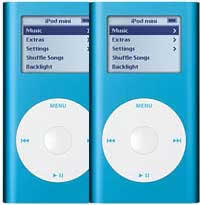 Stratospheric iPod sales send Apple executives into raptures of hugging joy, with profits almost quadrupling in a year.
Stratospheric iPod sales send Apple executives into raptures of hugging joy, with profits almost quadrupling in a year.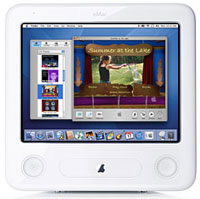 The Power Mac desktop computers were among the worst performers, with year-over-year shipments declining by 19 per cent.
The Power Mac desktop computers were among the worst performers, with year-over-year shipments declining by 19 per cent.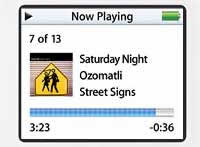 Although sales of iPods increased by 16 per cent, revenue from the product dropped by 16 per cent after Apple added the lower-cost iPod Shuffle to its range.
Although sales of iPods increased by 16 per cent, revenue from the product dropped by 16 per cent after Apple added the lower-cost iPod Shuffle to its range. This powerful core application lets users search just about everything on their system – files, emails, contacts, images, movies, calendars and applications – with the results appearing “instantly”.
This powerful core application lets users search just about everything on their system – files, emails, contacts, images, movies, calendars and applications – with the results appearing “instantly”.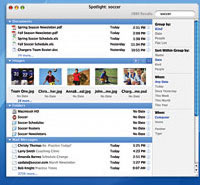 Mac OS X version 10.4 “Tiger” will be available on 29 April from 6:00 pm at Apple’s retail stores and through Apple Authorised Resellers for a suggested retail price of £89 (US$129, €129)
Mac OS X version 10.4 “Tiger” will be available on 29 April from 6:00 pm at Apple’s retail stores and through Apple Authorised Resellers for a suggested retail price of £89 (US$129, €129)